Winter Light (1962) – Written and directed by Ingmar Bergman, starring Gunnar Björnstrand, Max von Sydow and Ingrid Thulin.
My G-d this is a bleak film. Powerful. Important, perhaps. With tremendous acting from all three principals. And interesting and excellent direction from Bergman. But incredibly bleak. Even Sven Nykvist’s cinematography, which can be so beautiful and poetic, cuts sharp, harsh and without mercy. There’s not a single frame of this film that offers any comfort. There's no way out, which is what I think Bergman was getting at. People often discuss his existentialism or atheism, but it struck me after watching this that there's actually something Buddhistic in his outlook. But, 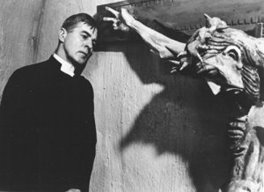 oh man, it's tough going. We really enjoyed the first part of Bergman’s Silence Trilogy, Through a Glass Darkly, (see previous Recent Screenings) and were looking forward to this one. In the end, I don’t think Winter Light is as complete a film as the previous one. And it’s certainly not as enjoyable. But it has lingered with me for two weeks, and I respect that. And Bergman is one of the very few directors who truly and deeply probes the tougher spiritual questions. Oh man, if you want to spend a dreary winter afternoon with a Lutheran priest in a dead parish as he loses faith in the Almighty, offers no help to a suicidal parishioner and treats cruelly the one person who loves him, then this is the film for you. Thank G-d Bergman keeps it to 80 minutes. Another half-hour of this and I’d have been listening to Leonard Cohen’s “Dress Rehearsal Rag” and fingering my safety razor. RECOMMENDED (But Not for Everyone). 8/10
oh man, it's tough going. We really enjoyed the first part of Bergman’s Silence Trilogy, Through a Glass Darkly, (see previous Recent Screenings) and were looking forward to this one. In the end, I don’t think Winter Light is as complete a film as the previous one. And it’s certainly not as enjoyable. But it has lingered with me for two weeks, and I respect that. And Bergman is one of the very few directors who truly and deeply probes the tougher spiritual questions. Oh man, if you want to spend a dreary winter afternoon with a Lutheran priest in a dead parish as he loses faith in the Almighty, offers no help to a suicidal parishioner and treats cruelly the one person who loves him, then this is the film for you. Thank G-d Bergman keeps it to 80 minutes. Another half-hour of this and I’d have been listening to Leonard Cohen’s “Dress Rehearsal Rag” and fingering my safety razor. RECOMMENDED (But Not for Everyone). 8/10
I Married a Witch (1942) – Directed by René Clair, starring Veronica Lake and Fredric March.
Brooklyn girl Veronica Lake was on quite a roll in 1942, starring in the great Sullivan’s Travels, two excellent film noir efforts with Alan Ladd - This Gun for Hire (based on a novel by Graham Greene) and The Glass Key (based on a novel by Dashiel Hammett) - and this delightful 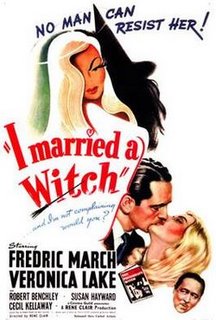 supernatural comedy about a witch who entangles herself in the life of a Gubernatorial candidate, played by Fredric March. As good an actor as March was, and he was very good and deserves to be remembered more than he is, Veronica steals the show. She somehow manages to be mischievous, innocent, hilarious and sexy all at the same time. Directed by the great French director René Clair (The Italian Straw Hat, Le Millon) during his sojourn in Hollywood, the film moves along at a quick clip and has several wonderful comic moments. (It would later serve as the basis for the television show Bewitched.) Unfortunately for Lake, her life wasn’t exactly a laughing matter. After a meteoric rise to the top, when she was courted by Howard Hughes and Aristotle Onassis, her career plummeted almost as quickly. A reporter discovered her again in the 1960s working as a barmaid in a New York hotel. But her films in the early 1940s remain a testament to a very special and beautiful talent. RECOMMENDED. 7-8/10.
supernatural comedy about a witch who entangles herself in the life of a Gubernatorial candidate, played by Fredric March. As good an actor as March was, and he was very good and deserves to be remembered more than he is, Veronica steals the show. She somehow manages to be mischievous, innocent, hilarious and sexy all at the same time. Directed by the great French director René Clair (The Italian Straw Hat, Le Millon) during his sojourn in Hollywood, the film moves along at a quick clip and has several wonderful comic moments. (It would later serve as the basis for the television show Bewitched.) Unfortunately for Lake, her life wasn’t exactly a laughing matter. After a meteoric rise to the top, when she was courted by Howard Hughes and Aristotle Onassis, her career plummeted almost as quickly. A reporter discovered her again in the 1960s working as a barmaid in a New York hotel. But her films in the early 1940s remain a testament to a very special and beautiful talent. RECOMMENDED. 7-8/10.
Syriana (2005) – Written and directed by Stephen Gaghan, starring George Clooney, Matt Damon, Jeffrey Wright, Chris Cooper, Amanda Peet, Christopher Plummer.
In scope and style, this reminded me of Steven Soderberg’s Traffic, and it turns out to have been written by the same guy. It’s a good film in many ways and does an excellent job showing the interconnections (obvious and not so obvious) of global petrol politics. But it’s incredibly hard  to follow at times. We stopped the DVD on several occasions, trying to figure out who was who and what exactly was happening. Probably would have worked better as a mini-series, something along the lines of those BBC efforts to tackle John LeCarré’s complex works. As it stands, I came away a bit frustrated, but I also wanted to read the book it was based on. And I want to see the film again at some point, which is a good sign. So, we'll say it's problematic but worthwhile. You won't get many films talking about global politics as well as this on does. Clooney does a fine job, but I’m not sure why he won an Oscar for Best Supporting Actor. Oh, right, because he wasn’t going to get Best Director for Good Night, and Good Luck. RECOMMENDED. 7/10
to follow at times. We stopped the DVD on several occasions, trying to figure out who was who and what exactly was happening. Probably would have worked better as a mini-series, something along the lines of those BBC efforts to tackle John LeCarré’s complex works. As it stands, I came away a bit frustrated, but I also wanted to read the book it was based on. And I want to see the film again at some point, which is a good sign. So, we'll say it's problematic but worthwhile. You won't get many films talking about global politics as well as this on does. Clooney does a fine job, but I’m not sure why he won an Oscar for Best Supporting Actor. Oh, right, because he wasn’t going to get Best Director for Good Night, and Good Luck. RECOMMENDED. 7/10
The Farmer's Daughter (1947) – Directed by H.C. Potter, starring Loretta Young, Joseph Cotten, Ethel Barrymore.
What a pleasant surprise. La Reina was a bit down one Friday, so I worked overtime to find something she’d like. I did an advanced search on IMDB for all comedies produced in the U.S. between 1934 and 1950 that had IMDB rankings higher than 6.0. I went carefully through the list – it’s scary how many we’d already seen - and this was one I’d never heard of. But the film earned Loretta Young an Oscar for Best Actress, it had good reviews and, most importantly, it starred Joseph Cotten, who La Reina has always had a bit of a crush on. 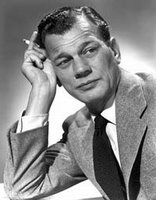 I thought she would like it, and I think she did, but I may have enjoyed it even more. The lovely Loretta Young (The Bishop’s Wife) plays a Swedish farm girl who leaves home to go to nursing school in “Capital City.” But she immediately runs into trouble and winds up having to take a temporary job as a waitress at a political shindig hosted by a wealthy family whose son, Cotten, is a young, idealistic Congressman. Loretta winds up working for the family and gets more involved in politics until she actually winds up running for office herself. It’s very much a Frank Capra-esque film – sort of Mr. Smith Goes to Washington but with a strong-willed woman and Swedish farmers. It’s sentimental, yes, but it’s also got an intelligently done script that supplies plenty of comedy, some good bi-partisan pokes at corrupt politics (you’re never given the names of the parties), a little action ( a fight scene involving Loretta’s hunky Swedish brothers from the farm), great acting by all invloved, and some nicely developed interpersonal relationships. (Oh, yes, and romance, of course.) The film also features splendid cinematography, including two well-constructed scenes that really knocked me out, the kind of rare gems that make movie-watching so pleasurable. And I'll admit it, I’m a sucker for those 1930s-40s films when the common guy or gal would take on the crooked political system and win. We can laugh now at the naiveté, but there are some strong little speeches tucked away in these films, including one here, and they really show that our political system hasn’t changed much over time, only our attitudes toward it have become increasingly cynical. Anyway, The Farmer’s Daughter isn’t the greatest film ever made, but I think it could be a pleasant surpise for other people besides me. RECOMMENDED. 8/10
I thought she would like it, and I think she did, but I may have enjoyed it even more. The lovely Loretta Young (The Bishop’s Wife) plays a Swedish farm girl who leaves home to go to nursing school in “Capital City.” But she immediately runs into trouble and winds up having to take a temporary job as a waitress at a political shindig hosted by a wealthy family whose son, Cotten, is a young, idealistic Congressman. Loretta winds up working for the family and gets more involved in politics until she actually winds up running for office herself. It’s very much a Frank Capra-esque film – sort of Mr. Smith Goes to Washington but with a strong-willed woman and Swedish farmers. It’s sentimental, yes, but it’s also got an intelligently done script that supplies plenty of comedy, some good bi-partisan pokes at corrupt politics (you’re never given the names of the parties), a little action ( a fight scene involving Loretta’s hunky Swedish brothers from the farm), great acting by all invloved, and some nicely developed interpersonal relationships. (Oh, yes, and romance, of course.) The film also features splendid cinematography, including two well-constructed scenes that really knocked me out, the kind of rare gems that make movie-watching so pleasurable. And I'll admit it, I’m a sucker for those 1930s-40s films when the common guy or gal would take on the crooked political system and win. We can laugh now at the naiveté, but there are some strong little speeches tucked away in these films, including one here, and they really show that our political system hasn’t changed much over time, only our attitudes toward it have become increasingly cynical. Anyway, The Farmer’s Daughter isn’t the greatest film ever made, but I think it could be a pleasant surpise for other people besides me. RECOMMENDED. 8/10
Portrait of Jennie (1948) –
Directed by William Dieterle, starring Jennifer Jones, Joseph Cotten and Ethel Barrymore.
If you’re noticing a pattern here, you’re right.
I re-kindled La Reina’s crush on Joseph Cotten, so we had to do a little Joseph Cotten film cycle.
Cotten’s next film after
The Farmer’s Daughter, actually won him an award for Best Actor at the Venice Film Festival in 1948.
He was
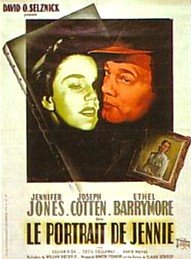
at the peak of his career in the late 1940s.
The film after this one turned out to be one of the all-time greats,
The Third Man. In
Portrait of Jennie, he plays a down-on-his-luck artist who encounters a quirky young girl in
Central Park one night.
She inspires him to do new and powerful art, so he keeps looking for her in the park.
But something strange is going on with the girl.
He becomes more and more obsessed with her and the mystery deepens, leading him to paint more intensely and find himself on a journey to track her down that eventually climaxes in a raging sea-storm.
Cinematographer Joseph H. August does several interesting things in this film, using a filter to create a canvas-like effect at times; manipulating shadows for a strange, dreamy atmosphere; and actually shooting some of the best realistic shots of
New York City that I’ve ever seen in a
Hollywood film.
The score by Dimitri Tiompkin is based on themes by Debussy and enhances the lyrical melancholy of the film.
Some will find it overly sentimental, but I liked the mood it created.
A dark and aching romanticism.
7-8/10.
Gaslight (1944) – Directed by George Cukor, starring Ingrid Bergman, Charles Boyer, Joseph Cotten and Angela Lansbury.
Ingrid won an Academy Award for Best Actress for this role, and the film was nominated for seven Oscars altogether, including Best Picture, which it lost to the tepid Going My Way. (The  nominee that should have won that year, hands down, was Double Indemnity.) Boyer was nominated for Best Actor (losing to Herr Bing) and Angela Lansbury, in her first role, received a nod for Best Supporting Actress. They all deserved their nominations. Joseph Cotten, the reason we watched this one to begin with, wasn’t nominated for his role, but he also does well. Gaslight is a classic psychological thriller about . . . er . . . a newlywed couple. I’d heard so much about the film, and have certainly used the phrase “to gaslight someone,” though I haven’t actually engaged in the practice, or at least not so that La Reina would notice. Amazingly, the film lived up to my expectations. A great, moody atmosphere, though it’s almost too oppressive at times – just when I was about to beg for mercy, it let up. And I have to say, though he never really gets mentioned as one of the Great American Directors, George Cukor had an incredible career, directing four of my Top 100 Favorite Films: Holiday, Born Yesterday, Adam’s Rib and The Philadelphia Story, not to mention Gone with the Wind (with about 3 other people), A Star is Born, Dinner at Eight, My Fair Lady and several other classics. RECOMMENDED. 8/10
nominee that should have won that year, hands down, was Double Indemnity.) Boyer was nominated for Best Actor (losing to Herr Bing) and Angela Lansbury, in her first role, received a nod for Best Supporting Actress. They all deserved their nominations. Joseph Cotten, the reason we watched this one to begin with, wasn’t nominated for his role, but he also does well. Gaslight is a classic psychological thriller about . . . er . . . a newlywed couple. I’d heard so much about the film, and have certainly used the phrase “to gaslight someone,” though I haven’t actually engaged in the practice, or at least not so that La Reina would notice. Amazingly, the film lived up to my expectations. A great, moody atmosphere, though it’s almost too oppressive at times – just when I was about to beg for mercy, it let up. And I have to say, though he never really gets mentioned as one of the Great American Directors, George Cukor had an incredible career, directing four of my Top 100 Favorite Films: Holiday, Born Yesterday, Adam’s Rib and The Philadelphia Story, not to mention Gone with the Wind (with about 3 other people), A Star is Born, Dinner at Eight, My Fair Lady and several other classics. RECOMMENDED. 8/10
The White Countess (2005) – Directed by James Ivory, screenplay by Kazuo Ishiguro, starring Ralph Fiennes, Natasha Richardson, and Vanessa and Lynn Redgrave.
Set in Shanghai in 1936, The White Countess has a cool, exotic atmosphere, some very strong acting, and an interesting storyline, but the parts never really come together as a whole and the 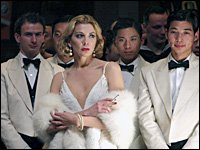 film plods along without much energy. The script by Ishiguro, author of The Remains of the Day, works well, so I pin the blame on James Ivory’s direction. Fiennes plays a former American diplomat who worked with the League of Nations but has lost everything (including his sight) in the violence of various international conflicts, leaving him fatalistic about politics and life. Richardson is a countess from Russia who now lives in poverty in Shanghai and has to work as a “hostess” in nightclubs and sometimes sleep with the clientele in order to support her once aristocratic family. She and Fiennes are both excellent. (In fact, Fiennes has been excellent in two other films I've seen recently, The Constant Gardener and Harry Potter and the Goblet of Fire.) The Redgrave sisters show up as Natasha's mother and aunt, and, of course, they really are her mother and aunt, except that in this case her mother plays her aunt and her aunt plays her mother. Or something like that. Just to keep you on your toes, I guess. The soundtrack to the film offers an interesting melange of swing jazz with Asian touches, melancholy Russian songs and a beautiful score. The White Countess is worth watching, but it could have been something special. 6-7/10.
film plods along without much energy. The script by Ishiguro, author of The Remains of the Day, works well, so I pin the blame on James Ivory’s direction. Fiennes plays a former American diplomat who worked with the League of Nations but has lost everything (including his sight) in the violence of various international conflicts, leaving him fatalistic about politics and life. Richardson is a countess from Russia who now lives in poverty in Shanghai and has to work as a “hostess” in nightclubs and sometimes sleep with the clientele in order to support her once aristocratic family. She and Fiennes are both excellent. (In fact, Fiennes has been excellent in two other films I've seen recently, The Constant Gardener and Harry Potter and the Goblet of Fire.) The Redgrave sisters show up as Natasha's mother and aunt, and, of course, they really are her mother and aunt, except that in this case her mother plays her aunt and her aunt plays her mother. Or something like that. Just to keep you on your toes, I guess. The soundtrack to the film offers an interesting melange of swing jazz with Asian touches, melancholy Russian songs and a beautiful score. The White Countess is worth watching, but it could have been something special. 6-7/10.
Good Night, Constance Ockelman
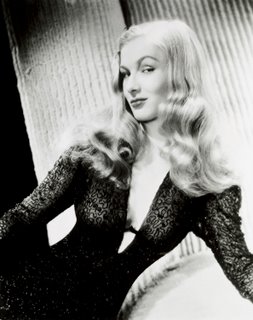
 oh man, it's tough going. We really enjoyed the first part of Bergman’s Silence Trilogy, Through a Glass Darkly, (see previous Recent Screenings) and were looking forward to this one. In the end, I don’t think Winter Light is as complete a film as the previous one. And it’s certainly not as enjoyable. But it has lingered with me for two weeks, and I respect that. And Bergman is one of the very few directors who truly and deeply probes the tougher spiritual questions. Oh man, if you want to spend a dreary winter afternoon with a Lutheran priest in a dead parish as he loses faith in the Almighty, offers no help to a suicidal parishioner and treats cruelly the one person who loves him, then this is the film for you. Thank G-d Bergman keeps it to 80 minutes. Another half-hour of this and I’d have been listening to Leonard Cohen’s “Dress Rehearsal Rag” and fingering my safety razor. RECOMMENDED (But Not for Everyone). 8/10
oh man, it's tough going. We really enjoyed the first part of Bergman’s Silence Trilogy, Through a Glass Darkly, (see previous Recent Screenings) and were looking forward to this one. In the end, I don’t think Winter Light is as complete a film as the previous one. And it’s certainly not as enjoyable. But it has lingered with me for two weeks, and I respect that. And Bergman is one of the very few directors who truly and deeply probes the tougher spiritual questions. Oh man, if you want to spend a dreary winter afternoon with a Lutheran priest in a dead parish as he loses faith in the Almighty, offers no help to a suicidal parishioner and treats cruelly the one person who loves him, then this is the film for you. Thank G-d Bergman keeps it to 80 minutes. Another half-hour of this and I’d have been listening to Leonard Cohen’s “Dress Rehearsal Rag” and fingering my safety razor. RECOMMENDED (But Not for Everyone). 8/10 supernatural comedy about a witch who entangles herself in the life of a Gubernatorial candidate, played by Fredric March. As good an actor as March was, and he was very good and deserves to be remembered more than he is, Veronica steals the show. She somehow manages to be mischievous, innocent, hilarious and sexy all at the same time. Directed by the great French director René Clair (The Italian Straw Hat, Le Millon) during his sojourn in
supernatural comedy about a witch who entangles herself in the life of a Gubernatorial candidate, played by Fredric March. As good an actor as March was, and he was very good and deserves to be remembered more than he is, Veronica steals the show. She somehow manages to be mischievous, innocent, hilarious and sexy all at the same time. Directed by the great French director René Clair (The Italian Straw Hat, Le Millon) during his sojourn in  to follow at times. We stopped the DVD on several occasions, trying to figure out who was who and what exactly was happening. Probably would have worked better as a mini-series, something along the lines of those BBC efforts to tackle John LeCarré’s complex works. As it stands, I came away a bit frustrated, but I also wanted to read the book it was based on. And I want to see the film again at some point, which is a good sign. So, we'll say it's problematic but worthwhile. You won't get many films talking about global politics as well as this on does. Clooney does a fine job, but I’m not sure why he won an Oscar for Best Supporting Actor. Oh, right, because he wasn’t going to get Best Director for Good Night, and Good Luck. RECOMMENDED. 7/10
to follow at times. We stopped the DVD on several occasions, trying to figure out who was who and what exactly was happening. Probably would have worked better as a mini-series, something along the lines of those BBC efforts to tackle John LeCarré’s complex works. As it stands, I came away a bit frustrated, but I also wanted to read the book it was based on. And I want to see the film again at some point, which is a good sign. So, we'll say it's problematic but worthwhile. You won't get many films talking about global politics as well as this on does. Clooney does a fine job, but I’m not sure why he won an Oscar for Best Supporting Actor. Oh, right, because he wasn’t going to get Best Director for Good Night, and Good Luck. RECOMMENDED. 7/10 I thought she would like it, and I think she did, but I may have enjoyed it even more. The lovely Loretta Young (The Bishop’s Wife) plays a Swedish farm girl who leaves home to go to nursing school in “
I thought she would like it, and I think she did, but I may have enjoyed it even more. The lovely Loretta Young (The Bishop’s Wife) plays a Swedish farm girl who leaves home to go to nursing school in “ at the peak of his career in the late 1940s. The film after this one turned out to be one of the all-time greats, The Third Man. In Portrait of Jennie, he plays a down-on-his-luck artist who encounters a quirky young girl in
at the peak of his career in the late 1940s. The film after this one turned out to be one of the all-time greats, The Third Man. In Portrait of Jennie, he plays a down-on-his-luck artist who encounters a quirky young girl in  nominee that should have won that year, hands down, was Double Indemnity.) Boyer was nominated for Best Actor (losing to Herr Bing) and Angela Lansbury, in her first role, received a
nominee that should have won that year, hands down, was Double Indemnity.) Boyer was nominated for Best Actor (losing to Herr Bing) and Angela Lansbury, in her first role, received a  film plods along without much energy. The script by Ishiguro, author of The Remains of the Day, works well, so I pin the blame on James Ivory’s direction. Fiennes plays a former American diplomat who worked with the
film plods along without much energy. The script by Ishiguro, author of The Remains of the Day, works well, so I pin the blame on James Ivory’s direction. Fiennes plays a former American diplomat who worked with the 





















8 comments:
You guys do see a lot of movies (the grad student says with envy). Had you never seen Gaslight?
I rented and watched Bergman's Silence trilogy a few years ago. Brutal and beautiful.
Great reviews, cowboy.
Wow - an interesting collection of movies. I've only seen a couple of Berman movies ... Wild Strawberries and The Seventh Seal. Of all those you mention, Gaslight is my favorite - Ingrid Bergman and Angela Landsburt :-) Great reviews.
Oops - forgot Scenes from a Marriage and the Magic Flute - he he ever made an upbeat movie? :-)
Smiles of a Summer Night was Bergman's comedy. It was turned into a Stephen Sondheim musical: A Little Night Music.
By the way, cowboy, 103rd Street at Broadway has been named Humphrey Bogart Place. I believe it's where he grew up. We must make a pilgrimage next time you're in my neighborbood.
Liam,
We do see a lot of movies. But we don't watch normal television, with the exception of some football now and then. And we'll spread a movie out over two nights sometimes during the week. So, instead of watching CSI twice a week, we're watching a film. And we'll ususally see a couple on the weekend. We check things out from the library, so we don't spend any money. It seems to work out well.
No, I'd never seen Gaslight. As many films as I have seen, there are still many, many classics I've missed.
We'll try the last pat of the Bergman trilogy soon, I suppose. Hopefullly it won't be quite as bleak as Winter Light.
Yes, I did see the news about Bogart Place - didn't we exchange emails about that? Or maybe I just thought I shgould email you. Yes, a pilgrammage is in order.
Crystal,
No, I don't think upbeat was Bergman's thing. Though he does have a sly sense of humor running through several of his films. I really liked The Magician, though it wasn't upbeat either.
Gaslight was a great picture. Very reminiscent of Rebecca.
I've only seen a couple of Bergman films - The Seventh Seal (magnificent), and The Best Intentions, which was about his parents' lives, and was very good. This other one sounds interesting. I'll have to check it out. Thanks.
Jeff, if you've only seen Seventh Seal and Best Intentions, I'm not sure I would watch Winter Light next. I think I'd go with The Magician, Wild Strawberries, or Fanny and Alexander. Or even the first part of the trilogy, Through a Glass Darkly.
Thanks. I'll take it under advisement, although I think I could jump into it, because I'm into pathos in movies big-time.
That's a great photo of Veronica Lake... The "Peek-a-Boo Girl". Sad life though... It's amazing how many of the blonde bombshells of that era wound up having lives marked by horrible tragedy and/or mental illness. Frances farmer, Lana Turner, Jean Harlow, Jayne Mansfield, Marilyn Monroe...
Post a Comment